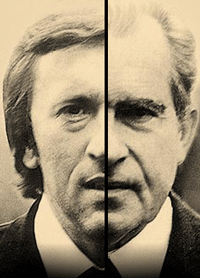In an eerily appropriate time when American politics stands at the crossroads of hope and change, all the while being reminded of the dirty side of politics with the wiretapping scandal currently embroiling Illinois Governor Rod R. Blagojevich, arrives Ron Howard’s cinematic adaptation of the Frost/Nixon Interviews.
Released on December 5th, and to wider screenings on December 25th, Universal Pictures’ film is based on the play “Frost/Nixon” by British screenwriter Peter Morgan. The play premiered in London in August of 2006 and also went on to Broadway in March 2007. But, of course, both the play and film are based on the original series or televised interviews from 1977 granted to British journalist David Frost by the late U.S. President Richard Nixon.
The interviews were conducted on August 9th, 1974, three years after President Nixon resigned following the infamous Watergate scandal.
The Watergate scandal erupted after five men linked to President Nixon’s staff were arrested for breaking and entering into the Democratic National Committee headquarters at the Watergate Office complex in Washington, D.C., on June 17, 1972. What followed was a disturbing trail of audio evidence revealing a shocking scope of abuse of power by the Nixon White House.
The Frost/Nixon interviews were President Nixon’s first real opportunity to come clean in front of the nation through a series of interviews stretching over 12 days for over 28 hours.
A new DVD, Frost/Nixon: The Original Watergate Interviews, was released on December 2nd. It takes us back to the most compelling political interview ever. In addition to the four 90-minute interview installments originally broadcast, the DVD also provides an insightful introduction and behind-the-scenes look.
For instance, we learn about an uncanny small talk exchange between David Frost and Richard Nixon in which the former president says: “I wouldn’t want to be a Russian leader. You never know when they are being taped.”
We also learned about the background deal negotiations, which resulted in Nixon earning $600,000 plus 10% of the profits for agreeing to the lengthy interview process.
This epic battle of wills reveals the motivations of both gladiators in the ring. David Frost was famously perceived as a lightweight journalist, and having put his own money and reputation on the line, we can sense the interviewer’s need to establish his legitimacy. In fact, Nixon seems, at times, surprised and caught unprepared by the thorough nature of Frost’s questioning.
The result was a powerful moment in political journalism’s history, which captured the attention of 45 million television viewers -- then the largest television audience in history and still a record for a political interview.


